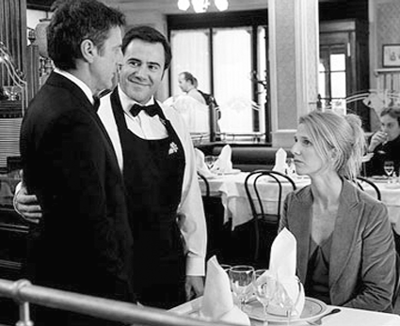A French buddy flick about a love triangle barely involves the woman
The new film “Apres Vous,” by French director Pierre Salvadori, has Louis (José Garcia) as a helpless, endearing screw-up who ricochets through life, exasperating and charming people who always rescue him from his latest disaster. On a lovely Parisian evening, his love life gone sour, Louis decides to end it all by hanging himself from a tree in the local park. Standing on a valise with a noose around his neck, he is poised to say goodbye to a world he can’t seem to understand.
Just as he kicks away the suitcase and begins to dangle and gag, along comes Antoine (Daniel Auteuil) who is tearing across the park, very late for a dinner appointment with his girlfriend Christine (Marilyn Canto). Antoine pauses for a second to catch his breath and as he looks up from his wristwatch, he notices the gasping Louis, eyes bulging and tongue distended, seconds from death. Antoine rushes to him and, in the first of a sequence of hilarious scenes that keep us howling throughout this delightful film, rescues the hapless Louis. Even as he fumbles to liberate Louis, we can see what is going on in Antoine’s head––“ I may live to regret this!”
Louis and Antoine are a match made in heaven. Antoine is the eternal Good Samaritan who thinks nothing of bringing this stranger home, treating him like a long-lost brother, seemingly oblivious as to how this albatross in the bedroom will affect his already shaky standing with the long-suffering Christine. A dead-ringer for the young Jack Lemmon in “Days of Wine and Roses,” Louis tells Antoine that he has mailed a suicide letter to his only living relative, his grandmother, who lives six hours away in the quaint fishing village of Saint Malo.
Deciding to intercept the letter before it reaches Grandmother, the two guys tear off down the road in what is the funniest segment of the film. They reach her doorstep just as the letter arrives. The woman confides to Antoine that she is nearly blind with cataracts and cannot read the letter. “Won’t you please read it for me,” she implores him. The action that follows is true comic genius, as Antoine ad-libs a text that will not upset the dear little old lady. Mission accomplished, they depart for Paris, but not before Louis smears a lipstick graffiti message on his grandmother’s coat which says “Old Whore.”
You’ll have to see the film to figure that one out.
Antoine has, it seems, developed a life plan for Louis. What’s next? Our boy Louis hasn’t had a job in years and has no apparent skills of any sort. No problem. Chez Jean, the up-scale restaurant where Antoine is maitre-d’ needs a sommelier. In a rib-splitting job interview scene, Louis manages to land the job with frantic help from Antoine whose gestures and facial expressions guide him to give the right answers to the stern interview panel.
Man, especially a French one, cannot live by bread alone. Louis now has a place to live (Antoine’s) and a job, but what about love? It’s time for reconciliation with the winsome Blanche (Sandrine Kiberlain), the reason for Louis’ suicidal despair. Antoine tracks her down and more comedy ensues, but… Antoine falls for Blanche. Even so, he does everything in his power to bring the two back together. In the process Antoine loses Christine. At this point, the film becomes more Shakespearean than Shakespeare.
And rather gay. It becomes increasingly apparent as this sexy, funny buddy flick unfolds that the most compelling attraction in the plot is between Antoine and Louis. They are not queer in the conventional sense, but they are “queer” for each other. What seems to matter most to both of them is what happens to the other guy; the other players––female romantic interests included––are peripheral to the energy between these two men. The gals are there and the plot revolves around boys and girls getting together, but if “interest” and “concern” are anything––and they are really everything––it’s the two guys who will never get bored with each other. This recognition that human nature often operates to make hot, hetero-leaning guys more interested in each other than in their girlfriends is very, well, French.
“Apres Vous” is a brilliant comic work. One test of its genius is the strength of its “silent film factor.” If one were to remove the dialogue from this film, it would still be a sad, funny, touching story. The acting is that good. And Paris looks more beautiful and seductive than ever.
gaycitynews.com


































